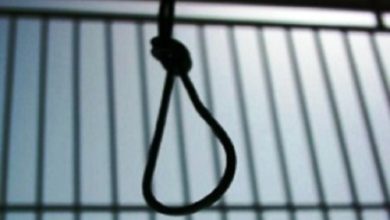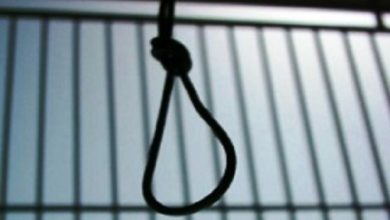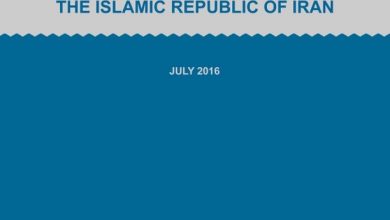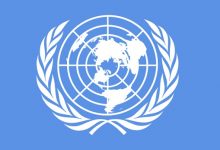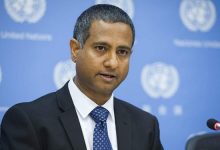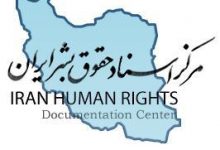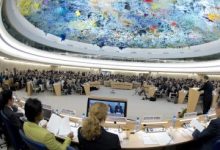All you need to know: A Quick Breakdown of Findings from Dr. Ahmed Shaheed’s Latest Report to the UN Human Rights Council (February 2013)
(March 1, 2013) — Dr. Ahmed Shaheed, Special Rapporteur on the situation of human rights in the Islamic Republic of Iran, has just released his latest report to the United Nations Human Rights Council. Read the 77 page report and IHRDC’s quick breakdown of the report’s highlights here:
Who is the Special Rapporteur?
Dr. Ahmed Shaheed was selected by the United Nations Human Rights Council in 2011 as a neutral party to investigate human rights violations in Iran and to write official reports based on these findings. Other special representatives and rapporteurs on Iran have preceded Dr. Shaheed, though with more specialized mandates. (A History of United Nations Special Representatives and Rapporteurs in Iran). In March 2012, the UN Human Rights Council voted in favor of a resolution to extend Dr. Shaheed’s mandate for another year.
What is in the report?
The latest report discusses what Dr. Shaheed found regarding a range of issues including free elections, freedom of expression, association and assembly, the situation of human rights activists and lawyers, torture, execution, economic rights, and the rights of women, ethnic and religious minorities, and the lesbian, gay, bisexual and transgender (LGBT) community. The report also provides conclusions and recommendations regarding the human rights situation in Iran.
What did the report find?
Free and Fair Elections (Paragraphs 11-14)
The UN Special Rapporteur (UNSR) found that widespread and systematic violations of human rights persist in the Islamic Republic of Iran. Regarding free elections, the UNSR reported that hundreds of prisoners are still being held due to their involvement in protests following the June 2009 presidential election. The UNSR also expressed his concern about Iran not having established an independent electoral authority to supervise the electoral process and ensure its compliance with the International Covenant on Civil and Political Rights (ICCPR). For more information on this topic see A Year Later: Suppression Continues in Iran.
Freedom of Expression, Association and Assembly (Paragraphs 15-18)
Dr. Shaheed’s report found that dozens of journalists and bloggers have been subjected to arrest, detention and prosecution. According to the UNSR, there is a broad “campaign to crack down on independent journalists and media outlets under the accusation that they have collaborated with ‘anti-revolutionary’ foreign media outlets and human rights organizations.” For more information on the Iranian government’s past record in targeting journalists and bloggers, see Forced Confessions: Targeting Iran’s Cyber-Journalists and Ctrl+Alt+Delete: Iran’s Response to the Internet.
Human Rights Defenders (Paragraphs 19-24)
The UNSR report also discussed the situation of human rights activists and lawyers, and stated that they are “subjected to harassment, arrest, interrogation and torture” and “are frequently charged with vaguely-defined national security crimes.” For additional information on this issue see Iranian Bar Association: Struggle for Independence and an open letter by 35 Iranian lawyers calling for the Iranian authorities to cease infringements on the independence of the legal profession.
Torture (Paragraphs 25-33)
The UNSR indicated that there were reports of widespread use of torture by Iranian authorities. Responding to the Iranian Government’s claim that Iranian law bans torture, the UNSR wrote “[T]he existence of these legal safeguards does not in itself invalidate allegations of torture, and does not remove the obligation to thoroughly investigate such allegations.” The case of Sattar Beheshti, a blogger who died while detained by Iranian authorities, as well as the case of Jamil Sowaidi who also died while in custody, were mentioned in the UNSR report. For more information about Mr. Sowaidi’s case read Ahwazi Arab political activist Jamil Sowaidi reportedly tortured to death in custody.
Executions (Paragraphs 34-36)
Dr. Shaheed expressed concern over the “escalating rate of executions” in Iran. In particular, the UNSR noted that the death penalty was imposed for crimes such as alcohol consumption, adultery and drug-trafficking, which do not meet the “most serious crimes” standard delineated in international law. Citing a total of between 489 to 497 executions in 2012, the UNSR also voiced concern over the lack of due process in capital cases. For further information on execution tallies see IHRDC Chart of Executions by the Islamic Republic of Iran – 2013 and IHRDC Chart of Execution by the Islamic Republic of Iran – 2012.
Women’s Rights (Paragraphs 37-52)
Regarding women’s rights, while the UNSR noted some progress in the areas of literacy, education and health, concern remained over gender-based disparity in economic participation. The UNSR also stated that the Iranian Government’s “emphasis on gender roles places limitations on the Iranian Government’s obligation to protect women’s full enjoyment of their civil, political, social, cultural, and economic rights.” Other issues discussed by the UNSR included restrictions on women’s movement and discriminatory laws, such as a law that denies the right to transfer of nationality to the husbands and children of women who marry non-Iranian men. For additional information on the discriminatory impact of Iran’s law against women see e.g., The Execution of Women in Iranian Criminal Law: an Examination of the Impact of Gender on Laws Concerning Capital Punishment in the New Islamic Penal Code.
Ethnic Minorities (Paragraphs 53-58)
The UNSR discussed the human rights situation of Ahwazi Arabs and Balochis. Regarding Ahwazi Arabs, the UNSR indicated that he was disturbed by reports of “arrests, detentions, and prosecutions for protected activities that promote social, economic, cultural, linguistic and environmental rights.” Regarding Balochis, the UNSR stated that according to reports, the Balochis are “subjected to systematic social, racial, religious, and economic discrimination.” Furthermore, the UNSR mentioned reports of destruction of Sunni mosques and religious schools as well as allegations that Sunni clerics have been imprisoned and assassinated. For an example of violations of the rights of Ahwazi Arabs see Death Sentences for Five Ahwazi Arabs Upheld by Iran’s Supreme Court. For more information on ethnic minorities see the Ethnic Rights issue page on IHRDC’s website.
Religious Minorities (Paragraphs 59-67)
The UNSR also commented on the situation of religious minorities in Iran. According to this report there are currently 110 Baha’is imprisoned for their religious beliefs, including two women who are nursing infants in prison. Also, there are reportedly at least 13 Protestant Christians imprisoned in Iran, while more than 300 Christians have been arrested since June 2010. Gonabadi Dervishes are also reportedly subjected to attacks on their places of worship, and they are arbitrarily arrested, tortured and prosecuted. Other religious groups mentioned by the UNSR as being persecuted for their beliefs were the Yarsan, a religious group active among Kurdish Iranians, and the spiritual community of El-Yasin. According to Dr. Shaheed, “the right of Iranians to choose their faith is increasingly at risk.” For further information on the Baha’i mothers mentioned above see Infant Sons of Two Baha’i Mothers in Semnan Facing Medical Complications. For more information on imprisoned Christians, see High Bail Set as Condition for Temporary Release of Imprisoned Christian Convert Mehrdad Sajjadi.
The Lesbian, Gay, Bisexual and Transgender (LGBT) Community (Paragraphs 68-70)
On the subject of the treatment of the LGBT community in Iran the UNSR noted that criminalizing same-sex relations may result in the violation of fundamental human rights guarantees. This report indicated that 15 individuals who interviewed with the UNSR stated that they were arrested at least once for their sexual orientation or for associating with other LGBT persons. In addition, a majority of these individuals reported that they were physically abused by family members, but they were afraid to report it to the authorities because they could be charged with a criminal act. For a first hand witness account of the challenges facing members of the LGBT minority, see the Witness Testimony of Maryam Ahmadi.
Socioeconomic Rights (Paragraphs 71-78)
Discussing violations of the right to education, the UNSR stated that since March 2005 at least 945 students have been deprived of the right to continue their education for at least one semester, and that at least 41 professors have been expelled from university. For a personal account about limitations on academic freedom see the Witness Statement of Sara. The UNSR also referred to the economic sanctions imposed on Iran as having a potentially detrimental humanitarian effect.
What does the UNSR recommend?
Paragraph 81(a) through 81 (e): Recommend that the Iranian Government cooperate with the UNSR, immediately investigate reprisals against individuals who cooperate with international human rights organizations, release civil society and human rights activists, and establish a National Human Rights Commission in accordance with Paris Principles.
Paragraphs 81(f) and 81 (g): Recommend that the Iranian Government examine and address those laws that contravene its international obligation to eliminate all forms of discrimination in law and practice, and call on the Iranian Government to immediately release prisoners of conscience
Paragraphs 81(h) and (i): Recommend that the Iranian Government investigate all allegations of torture and consider a moratorium on capital punishment.
Paragraphs 81 (j) and 81 (k): Recommend that the Iranian Government improve transparency on the impact of sanctions and to report on measures it has taken to protect its inhabitants from negative impacts of sanctions, and ask the UN and countries imposing sanctions to monitor the impact of sanctions.

